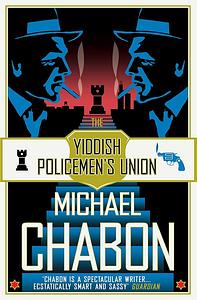Take a photo of a barcode or cover
I did not finish this novel. I was listening to it on audiobook and finally gave up at disc 4. It seemed to be a very popular book this year, but I simply tired of waiting for the writer to get to his point. The best that I can recollect is that this novel was SUPPOSED to deal with the murder of a talented, Yiddish chess player, who also happened to be the son of the "head hancho" in the Russian Jewish population. The son and the father were estranged for many years. Meyer, the investigator on the case, lived in the same hotel where the son was found dead. Ironically, Meyer has a great hatred for chess because his father was so obsessed with it when Meyer was a boy. That is the extent of what I could discern about the plot in the course of 4 audio discs. The remainder of the time these discs were playing the reader was spewing all the fancy literary devices used to move the plot nowhere. My mind was constantly wandering off because the story was moving nowhere...I wanted to scream, "GET TO THE POINT ALREADY." Literary device is extremely powerful when used to move the plot...but when the plot starts to move in circles or just stand still, it serves no purpose at all. This author could benefit from reading a little Aristotle. He had far too much "stuff" going on. One plot is sufficient for one novel.
Michael Chabon enjoys working in genres that he can use for literary pursuits. His noir-detective-novel-meets-question-of-Jewish-State-if-it-were-in-Alaska premise is hard to be beat for sheer oddity, and while I wasemotionally engaged in our hero's half-conscious pursuit of a better life through solving one last case in the last wilderness, the dreariness of his daily life and daily encounters in this novel made for a slower read than I feel Chabon intended.
Still, this novel and its mystery weave together questions of identity (Jewish or otherwise)and struggle that always fascinate, the reader especially when the plot doesn't grip you from scene to scene.
Still, this novel and its mystery weave together questions of identity (Jewish or otherwise)and struggle that always fascinate, the reader especially when the plot doesn't grip you from scene to scene.
It's speculative fiction -- that is, the plot starts with a historically counterfactual premise. It's a hard-boiled cop mystery. It's an immersion in the Orthodox Jewish and secular Yiddish cultures, as they were, are and might have been in a quasi-ghetto in Alaska. It's also a novel about how the Jewish protagonists go about solving their internal problems, and how they decide what to do when the gentiles, once again, come to take everything away.
Basically a fun book with serious bits. After about 50 pp. it was addictive.
Basically a fun book with serious bits. After about 50 pp. it was addictive.
So much more than a noir detective story with a clever gimmick ...it's about Jewishness and homeland and what's important about Israel...and, of course, the prose and the story are engaging and delightful and literary as well.
‘At once a gripping whodunit, a love story, an homage to 1940s noir, and an exploration of the mysteries of exile and redemption, "The Yiddish Policemen's Union" is a novel only Michael Chabon could have written.’
Well that blurb says it all. Michael Chabon is a master of prose, plot, and character. Benito Taganes + mentions of bicho-bicho, lumpia, and kundimans = kilig. I want 200 pages more!!
I really enjoyed the writing style but couldn't keep up with the story.
Mixed feelings about this one. The Yiddish Policeman's Union is set in an alternate version of history, one in which, post-Holocaust, Jewish refugees have been settled in the Federal District of Sitka, fearfully awaiting their fates when The Reversion occurs and Sitka ceases to exist as a Federal District but will revert to Alaskan control. It is a world in which the fledgling state of Israel exists briefly in 1948 before being destroyed and Sitka, despite being a harsh and depressing dump, despite being a ghetto, is nonetheless a place the Jews have called home post-Holocaust. The protagonist, Meyer Landsmann, is a Yiddish Policeman. He's a good detective with amazing powers of observation and recall but he's a bit of a mess - divorced, perpetually drunk, living in a crappy hotel. One of the hotel residents is discovered shot one day and Landsmann makes it his mission to solve the murder.
It took me about a 100+ pages or so to really get into the novel. Perhaps it was the language. When I first read A Clockwork Orange, it took me a while to figure out the alternate vocabulary that Burgess had created. But at a certain point, something clicked and I raced through the pages. Was it the same thing here? Trying to figure out the words and the rhythms of these Sitka Jews, on top of trying to figure out the context in which the story was unfolding (what is Reversion? what's going on with Sitka?). Perhaps it was the fragmented way in which the story unfolds.
The novel really picked up for me, as I said, about a 100+ pages in, when Landsmann and his partner (and cousin) Berko Shemets, uncover the identity of the dead man. The Yiddish Policeman's Union then transitions from a bizarre alternate version of history set in godknowswhere to a more conventional crime novel, albeit with a rather unconventional cast of characters.
It took me about a 100+ pages or so to really get into the novel. Perhaps it was the language. When I first read A Clockwork Orange, it took me a while to figure out the alternate vocabulary that Burgess had created. But at a certain point, something clicked and I raced through the pages. Was it the same thing here? Trying to figure out the words and the rhythms of these Sitka Jews, on top of trying to figure out the context in which the story was unfolding (what is Reversion? what's going on with Sitka?). Perhaps it was the fragmented way in which the story unfolds.
The novel really picked up for me, as I said, about a 100+ pages in, when Landsmann and his partner (and cousin) Berko Shemets, uncover the identity of the dead man. The Yiddish Policeman's Union then transitions from a bizarre alternate version of history set in godknowswhere to a more conventional crime novel, albeit with a rather unconventional cast of characters.
adventurous
dark
mysterious
medium-paced
Plot or Character Driven:
Plot
Strong character development:
Complicated
Loveable characters:
Complicated
Diverse cast of characters:
Complicated
Flaws of characters a main focus:
Yes
Interesting plot, but parts really dragged on. He's a great writer, though, so that kept me from ditching it early.
i simply couldn't read this. I was annoyed by the main character and I found the prose overwritten. Sorry. couldn't make it more than 50 pages



